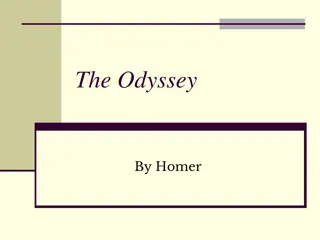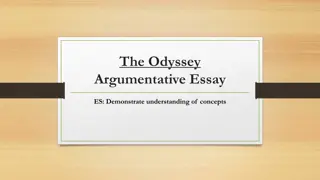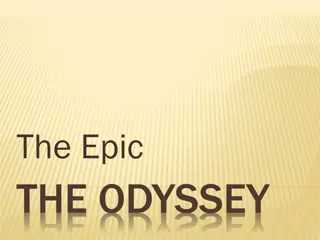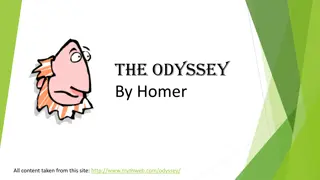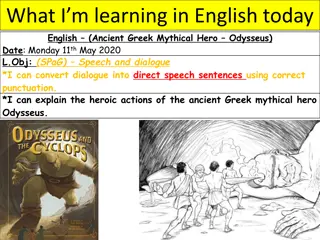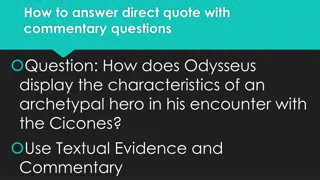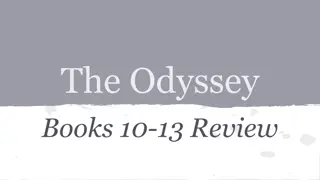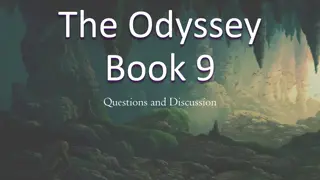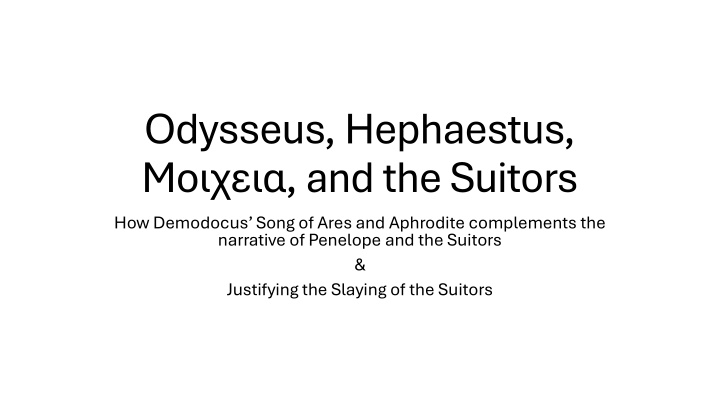
Intriguing Narrative of Odysseus, Hephaestus, and the Suitors in the Odyssey
Explore the peculiar tale of Hephaestus, Ares, and Aphrodite within the Odyssey, and how it relates to the overarching themes of deception, retribution, and divine intervention. Delve into the significance of this narrative alongside the justifying of the slaying of the Suitors in Penelope's story, revealing layers of moral complexities and divine influences.
Download Presentation

Please find below an Image/Link to download the presentation.
The content on the website is provided AS IS for your information and personal use only. It may not be sold, licensed, or shared on other websites without obtaining consent from the author. If you encounter any issues during the download, it is possible that the publisher has removed the file from their server.
You are allowed to download the files provided on this website for personal or commercial use, subject to the condition that they are used lawfully. All files are the property of their respective owners.
The content on the website is provided AS IS for your information and personal use only. It may not be sold, licensed, or shared on other websites without obtaining consent from the author.
E N D
Presentation Transcript
Odysseus, Hephaestus, , and the Suitors How Demodocus Song of Ares and Aphrodite complements the narrative of Penelope and the Suitors & Justifying the Slaying of the Suitors
Why this topic? I find the tale of Hephaestus, Ares, and Aphrodite to be the most interesting part of the Odyssey because of how unusual it is: Club-Footed Hephaestus Hunky Ares, Hot Aphrodite Hephaestus, despite his physical disadvantage, is victorious over Ares thru guile and craftsmanship It is funny. Why is it there? What does it have to do with the rest of the Odyssey? Why did the poet decide this tale was important enough to include alongside a song about the end of the Trojan War?
A Quick Note on / The Greek word (moy-KAY-uh) is often translated as adultery, but takes in a variety of different kinds of unauthorized sexual behavior which can be punished with impunity by the head of a household. It is not flat-out adultery or cheating, but illicit sex with a woman under the control/protection of another man. It is also achieved by persuasion rather than force. So when we talk about to (moy-KOY), we refer not just to adulterers or cheaters, but someone who is violating another man s honor and household.
Aldens Ideas 1. The song of Ares and Aphrodite anticipates, in the world of irresponsible and hilarious divine comedy, the deadly serious situation confronting Odysseus on his return to Ithaca. 2. That this story also encourages the audience to regard the suitors as despite the possibility for the interpretation of their pursuit of Penelope as a morally permissible action. 3. Hephaestus willingness to accept monetary compensation sets a negative example for Odysseus and enhances the triumph of Odysseus who insists on punishing [the suitors] with death.
Anticipating Ithaca and Subsidiary Narratives Alden argues that the song of Demodocus is one of a whole series of narratives subsidiary to the main plot which rehearse its concerns with the awful possibility of in the absence of the husband, and the need to punish such when it occurs. Orestes slaying of Aegisthus is presented as a righteous example of vengeance to Telemachus. Hephaestus, Ares, and Aphrodite The Trojan Horse story and conclusion of the 10-year long war started by the of Paris These narratives all anticipate the finale on Ithaca.
Encouraging the Audience At many points throughout the story the reader / listener is encouraged to view the suitors of Penelope negatively. The are initially introduced with the epithet haughty The narrator provides examples of their violations of xenia within Odysseus household Athena complains of their arrogance Athena is also the first to advocate for their slaughter But what about Book 18, line 270? Odysseus ordered Penelope to remarry once Telemachus beard is grown. Doesn t this mean the suitors are justified in their courtship of Penelope?
NOPE; THEY ARE STILL BAD Suitors This example comes in the latter 3rdof the narrative, after 17 Books of reinforcement that the suitors are in the wrong. We never actually hear Odysseus say this; possibly part of Penelope s ruse? Plus, it doesn t excuse the brazen violations of xenia the suitors have been committing.
Encouraging Odysseus In accepting the payment for Aphrodite s infidelity, Hephaestus himself becomes mocked. After seeing the lack of real consequences for Ares, another God remarks that he would gladly swap places with Ares if it meant he could get into bed with Aphrodite. Instead of the laughter being directed at the ensnared lovers, Hephaestus also becomes the butt of a joke. Odysseus can use this story of to guide his judgment and justify the slaughter of the suitors.
Conclusion Alden makes strong points for the argument that the story of Hephaestus, Ares, and Aphrodite functions as part of a series of other narratives within the Odyssey to warn Odysseus about the dangers of in his absence and how to deal with them. The secondary point of how the suitors are to be understood within the text of the Odyssey is also interesting and pertinent to discussions we ve had in class.
Thank you! Source: Alden, Maureen J. The Resonances of the Song of Ares and Aphrodite. Mnemosyne, vol. 50, no. 5, 1997, pp. 513 29. JSTOR, http://www.jstor.org/stable/4432770. Accessed 17 Mar. 2025.










